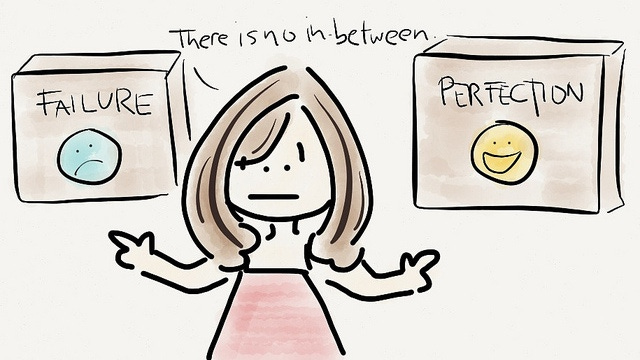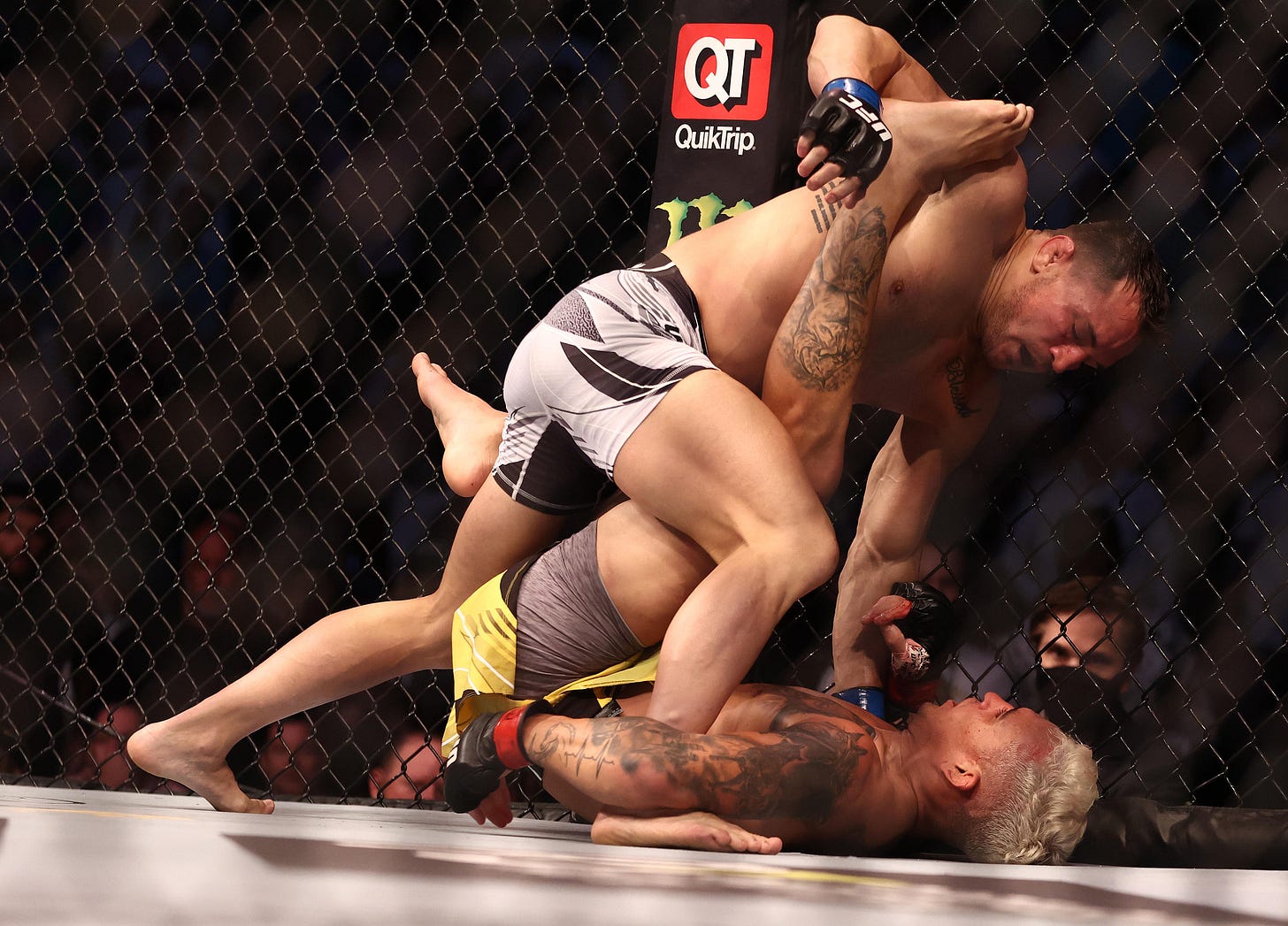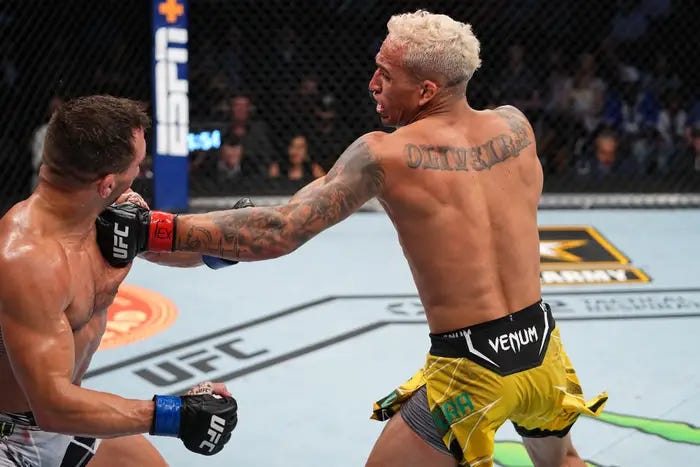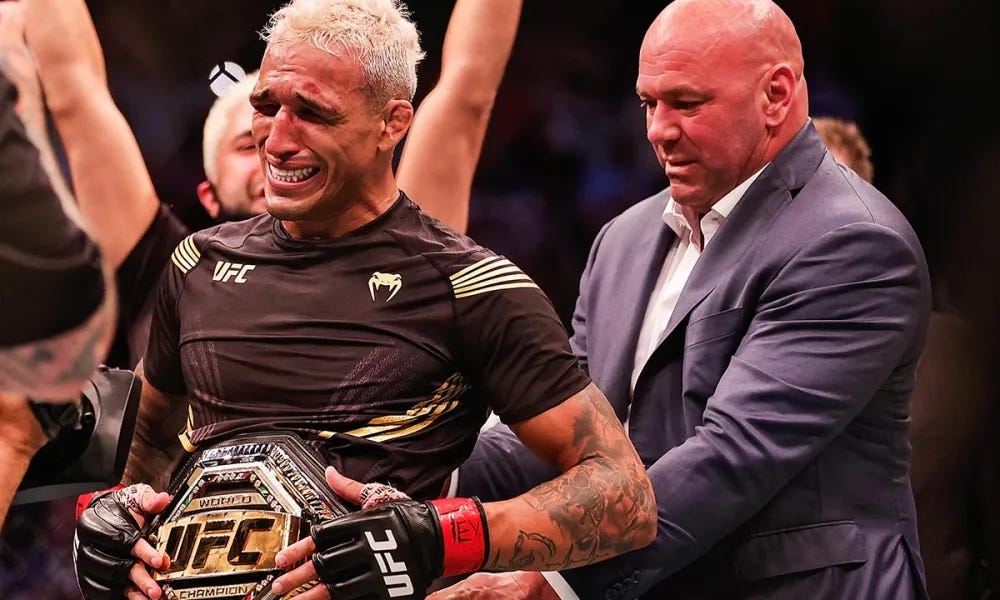There were times I thought of quitting—of leaving this as yet another unfished project. Like my TikTok food reviews under the alias “Joemaneats”, or the philosophy classes I would host for a few friends, or that book club that didn’t make it to the first meeting.
“Not many people read them anyway”
“I wanted to release an article once a month and it’s already been so much longer than that … what’s the point of writing a new one?”
This voice— the one that tells us that if something isn’t perfect, it isn’t worth doing—is what psychologists call the “All-or-Nothing Thinking Cognitive Distortion.”
In other words, when we view something as either a complete success or a total failure, with no middle ground or nuance, we leave no room for setbacks. And when setbacks inevitably occur, we crumble.
Think of it in terms of the phrase: “Might as Well.”
Imagine that for the past few weeks, you’ve been crushing a diet. Your friend invites you to dinner and for dessert, they offer you a warm chocolate chip cookie—your favorite. Being that you are just human, you eat the gosh darn cookie…
A couple of minutes later you think, to hell with it, this diet is already ruined—I might as well eat a few more of those delicious cookies, what does it matter at this point…
Now think of that time you forgot to reply to a friend’s text, and instead of responding with a quick apology, you think: “It’s already been a few days of me not answering—might as well leave it as is, there’s no point now”
Those who have tried to quit smoking might relate to a situation where, after a nice streak of a few days or weeks of no smoking, you take one puff, and suddenly that little voice kicks in: "Welp, the damage is already done... might as well smoke some more." The next day you wake up with a brand new vape in your pocket or a pack of Marlboro Reds in your bedside drawer—along with a whole lot of guilt and self-loathing.
But when we step back, it’s clear how flawed this logic is. Why make things worse just because of one small misstep?
A single cookie doesn’t erase weeks of healthy choices. One puff doesn’t mean you should pick up a bad habit again. And missing one article doesn’t mean I should stop writing altogether.
So why do we do this? it’s clearly pretty stupid…
In simple terms, All-or-Nothing Thinking is just another mechanism we use to run away from our mistakes, to avoid responsibility.
Now, you might think this conclusion is counterintuitive, I mean, how would continuing to make more of the same mistake be running away from it?
Well, it all has to do with what we expect of ourselves.
When you continue to screw up on purpose, you embrace the version of yourself that expects failure. Once you accept this role of someone who never follows through, then there’s no reason to feel guilty—it was expected of you to screw up.
In other words, you start to believe that you weren’t capable of positive change in the first place and thus shouldn’t feel bad for failing.
Again, if you are already a piece of shit, and that is all you’ll ever be, then what is the point of trying to be better? Might as well smoke that cigarette, keep ignoring your friend, eat that cookie…
In the opposite scenario—where you mess up and still choose to get back on track—you’re forced to face the fact that you failed. You have to apologize to your friend for not answering. You have to look yourself in the mirror and see someone who expects more of themselves.
That is a lot harder than quitting.
Of course, when it comes to things like addiction or eating disorders, it’s much more complicated. But for everyday struggles, the principle holds:
It’s not falling down that makes us failures. It’s staying down that does.
Enter Charles ‘Do Bronx’ Oliveira…
As a young fighter in the UFC, Charles was touted as a supremely talented yet mentally fragile combatant, a quitter. Despite being a world-class jiu-jitsu practitioner and a powerful striker, Oliveira would crumble when things got tough.
From 2010 to 2017, his UFC record was a shaky 10 wins and 8 losses. One moment, he was submitting someone in spectacular fashion, the next, he was the one getting finished. He was exciting, sure—but inconsistent, unreliable, and fragile.
But in 2018, something changed.
First, Charles rattled off three straight
submission wins in six months. Then Oliveira kept on winning—and not just winning but completely demolishing his opponents. (If you watched his fight against Tony Ferguson, you know what I’m talking about.)
All of a sudden, this mentally weak fighter had become a cold-blooded Brazilian killer. Eight straight wins later, Charles had earned himself a shot at the UFC Lightweight Championship belt against Michael Chandler…
The main event at UFC 262 between Oliveira and Chandler kicked off with a back-and-forth grappling exchange with no man clearly ahead. That is until Chandler caught Oliveira with a heavy right hook, dropping him—Chandler pounced, landing brutal ground-and-pound as the referee watched closely.
The crowd, the commentators, and every UFC fan thought the same thing:
“It’s over— Oliveira is going to fade like he always does, and Michael Chandler will be the new UFC champ”
Any other version of Oliveira might have given in. But this time, he didn’t. He survived the round.
And in the very first exchange of the second round, Oliveira landed a clean left hook dropping Michael Chandler. Charles pressed forward, and after a few extracurricular blows, the ref called off the fight—just like that, Charles ‘Do Bronx’ Oliveira was the new UFC Lightweight Champion.
In the span of two minutes, Oliveira rewrote his entire legacy.
After 28 fights in the UFC, after years of being dismissed as a "quitter," after every setback—Charles Oliveira proved that failure isn’t final.
Like most UFC fans, Charles Oliveira might have expected himself to quit at that moment—just as he had many times before. But he didn’t. This time, he demanded more of himself, and he got back up.
It sounds obvious, but if Charles had accepted the narrative of being a mentally fragile quitter, that’s exactly what he would have become, he would have lost the fight and never become a champion.
Not only that but as time went on, he kept proving his resilience, defending his belt a couple more times before eventually falling to the current champion, Islam Makhachev.
But by then, his legacy was already written. With the most finishes and submissions in UFC history, he had cemented himself as one of the greatest to ever do it.
Because, again, failure isn’t about falling down—it’s about staying down.
Anyway, the reason I’m nerding out over the UFC is to say that I’m sorry. I expected more of myself when it came to writing these articles and when I didn’t meet my own expectations, I let myself believe I wasn’t capable of continuing—that it was easier to just stop.
I like writing these. It’s hard but it’s pretty fulfilling. And just like Charles, I don’t want to let setbacks stop me from doing what I enjoy doing. I want to be resilient.
And trust me I know this isn’t my best work—telling you to get up when you fall isn’t the most profound insight. Despite that, sometimes the most basic things can be the most helpful—this has been helpful for me at least.
Anyway, I want to say that I’m back, and hopefully here to stay. So, stay tuned for some more philosophy content, personal reflections, and anything else I may want to write about.
(Here is the full fight if you want to see it)











It’s not falling down that makes us failures. It’s staying down that does. POWERFUL
LOVE JOEMAN